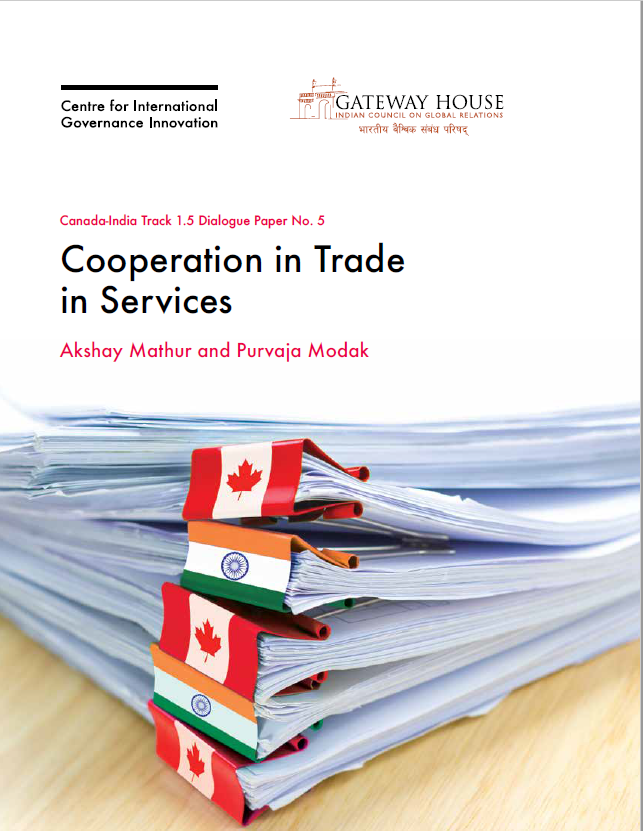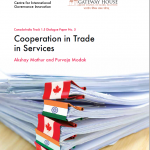This paper is part of the India-Canada Track 1.5 Dialogue.
India-Canada Track 1.5 Dialogue on Innovation, Growth and Prosperity is a collaboration between Gateway House: Indian Council on Global Relations and the Centre for International Governance Innovation (CIGI).
The India-Canada Track 1.5 Dialogue works jointly on multilateral issues and identifies areas where improved cooperation could benefit both countries. To address these challenges, the papers produced under this partnership will help to develop policy recommendations to promote innovation and navigate shared governance issues that are integral to the continued growth of Canada-India bilateral relations.

This paper is part of the India-Canada Track 1.5 Dialogue. View the second, third and fourth part of the four-part paper series.
Executive Summary
Over the past decade, there has been a shift in global trade from trade in goods to trade in services. Unlike goods, services are intangible and consumed by the user directly, without intermediate supervision. Thus, the only way to ensure the quality of a service is to enforce standards on the service provider. This is the responsibility of domestic sector-specific regulatory institutions established by the government.
The Indian and Canadian regulatory systems have: mature regulators (telecommunications, financial services); disaggregated or immature regulators (education, health care, real estate); or no regulators (information technology [IT]); represented by their respective chambers of commerce on specific issues.
Trade in services is: high for sectors with mature regulators, particularly for companies that are ready to invest in a foreign country to establish commercial presence; high for sectors without regulators, particularly those proficient in supplying the service across borders without commercial or staff presence; and low for sectors constrained by immature regulators or regulatory powers, disaggregated horizontally across agencies, or vertically between central, state and local governments.
To support their services trade, India and Canada can do the following:
a) Explore a mutual recognition agreement (MRA) on health-care services.
b) Develop an integrated bilateral economic assessment that includes regulations, foreign direct investment (FDI), intellectual property rights (IPRs) and value-added trade. This will provide the framework for the India-Canada Comprehensive Economic Partnership Agreement (CEPA).
c) Co-develop the emerging multilateral framework on services trade at the World Trade Organization (WTO) by creating sector-specific guidelines for service sectors, such as telecommunications, and on cross-cutting issues, such as the free flow of data.
d) Share services trade data between Indian and Canadian central banks for all transactions.
The current lack of data on services trade by partner country, company, mode of supply and value addition makes policy design difficult. This information can feed into current efforts by multilateral institutions to develop a universal framework for capturing services trade data.
You can download the PDF version of this paper here.
Akshay Mathur is former Director of Research, Gateway House.
Purvaja Modak is former Researcher, Geoeconomic Studies Programme, Gateway House.
This paper was exclusively written for Gateway House: Indian Council on Global Relations. You can read more exclusive content here.
For interview requests with the author, or for permission to republish, please contact outreach@gatewayhouse.in.
© Copyright 2020 Gateway House: Indian Council on Global Relations. All rights reserved. Any unauthorized copying or reproduction is strictly prohibited.


